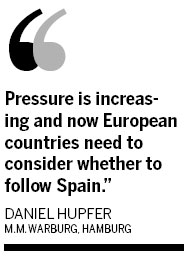World Business
Europe may follow Spain on stress tests
By Gavin Finch and Simon Clark (China Daily)
Updated: 2010-06-18 10:34
 |
Large Medium Small |
|
 |
|
Pedestrians pass the Bank of Spain in Madrid. The Bank of Spain has seized two lenders since the start of the financial crisis and is urging ailing banks to complete merger plans to tap a government rescue fund. [Denis Doyle / Bloomberg] |
LONDON - The Bank of Spain's decision to publish the results of stress tests on the nation's lenders may force European neighbors to follow suit as investors demand more disclosure of the risks on banks' books.
"Pressure is increasing and now European countries need to consider whether to follow Spain," said Daniel Hupfer, who helps manage $40 billion at M.M. Warburg in Hamburg, including shares of Deutsche Bank AG, BNP Paribas SA and Banco Santander SA. "Whether they will is hard to predict. Europe isn't really seeing eye-to-eye right now."
The Bank of Spain will make the findings public to give investors more information on the state of the banks, said Miguel Angel Fernandez Ordonez, the central bank governor, in a speech.

He didn't say whether he would release results on individual lenders. Banking groups in Germany and the UK said disclosing details on specific institutions carried risks.
Greece's sovereign debt woes have focused attention on Spain's public finances and the costs of buttressing the country's banks, including the foundation-based lenders known as "cajas" that have been hobbled by a surge in bad debts. The Bank of Spain has seized two lenders since the start of the financial crisis and is urging ailing cajas to complete merger plans to tap a government rescue fund.
Francisco Gonzalez, chairman of Banco Bilbao Vizcaya Argentaria SA, Spain's second-largest bank, added to concern about the nation's lenders this week when he said capital markets were closed to most Spanish companies and banks. He advocated "doing and publishing" stress tests.
"Europe needs this because the markets are asking for it," Gonzalez said on June 14. A spokeswoman for Santander, Spain's biggest bank, declined to comment.
The Bank of Spain has requested information from lenders and plans to publish the results in the "short term," a spokesman said, without being more specific.
Spokesmen at the Bundesbank, Bank of France, Bank of Italy and the Committee of European Banking Supervisors declined to comment when contacted by Bloomberg News. A spokeswoman at the Bank of Portugal didn't comment.
CNBC reported that Europe would publish its stress tests in coming weeks starting with Spain, citing ECB Executive Board member Lorenzo Bini Smaghi.
Spain's decision comes more than a year after the US released the results of stress tests it carried out on 19 financial institutions to determine whether they needed more capital following the subprime mortgage crisis. The US Treasury, whose tests measured how the biggest firms would perform if the economy worsened, promised to provide capital to banks that couldn't raise it.
The plan was criticized by some analysts and economists who said the tests weren't rigorous enough and others who said it could fuel investor concern. The effort forced banks including Wells Fargo & Co and Morgan Stanley to issue common equity after the Federal Reserve released results on May 7, 2009, that showed 10 of the 19 lenders needed new capital. It also kicked off a rally that lifted the Standard & Poor's Financials Index 36 percent from the start of May through the end of last year.
EU regulators are conducting confidential stress tests on the region's lenders after they racked up losses and writedowns during the financial crisis, leading to taxpayer-funded bailouts.
Bloomberg News



